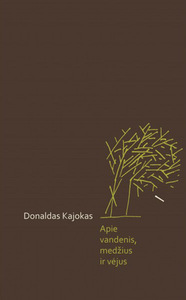Time for one's own bees 3
In brief: Donaldas Kajokas knows the world, life, language - that is why the texts live not in one form, not in one meaning. They invite, asking to pause, to return, and to be read once again. While higher mathematics is very simple, "terribly basic:/two times two for her always equals/ four (as much as you have)" (p. 73), in poetry it takes on a different quality and turns into linguistic quantity - content, which is covered with more than one cover. It is time to open it, while it is still November, while it is evening, while the world still can be vague and unexplained.
A person who has refused life, retired of (from ) noise that contains loneliness, because "noise resolves the world, divides it" in a connecting, nestling silence a person becomes whole; then he is able and starts listening to the world, talking to himself - the different one, the other. In the conversation, from the inner language, the inner talkativeness poetry is born as an answer, a response, your internal reverberation. It became lighter - the conversation took place.
Viktorija Daujotytė had noticed: poets are the language's chosen ones. It trusts them, as if the soul that felt the need of division, flowing into something, overflowing would converge with it and leave, penetrate beyond. That is the understanding of poet and poetry - accurate, thinking, more specifically making a connection with D. Kajokas poems. You can feel that through them speaks not only the poet, but a human, contemplating life and sometimes, seemingly, only a simple everyday life, its sundries; you feel how in the texts with a poetic language the soul speaks.
When writing poet meets himself like the other, sees himself through the eyes of the other, as said by V. Daujotytė, white piece of paper - the field of soul harmonization, at which you look, as if you are looking at a face, "you look, you see, you say. You address the silent, the one immersed in silence but the one who hears. Fully written page is a talking face of changing expressions, bringing up and weighing down." And then it makes sense: poet - he "and no one/else!" (p. 63) can live and survive only by writing, otherwise, while resting he might not have enough power to survive.









